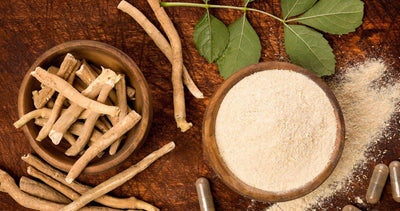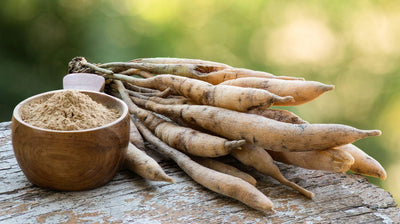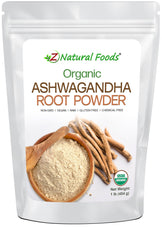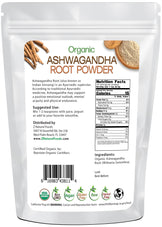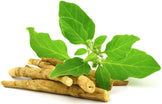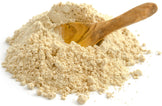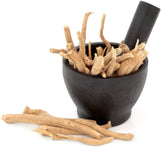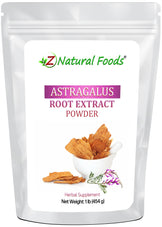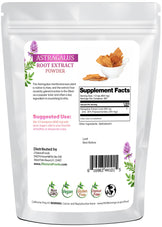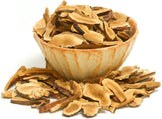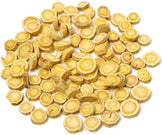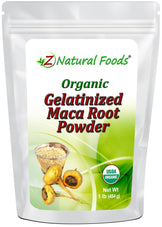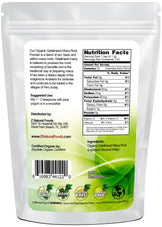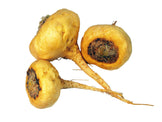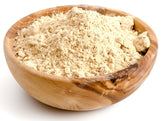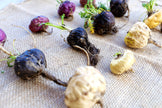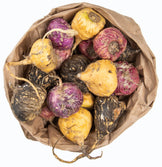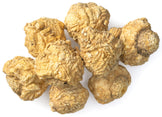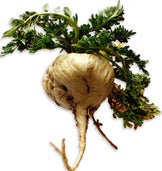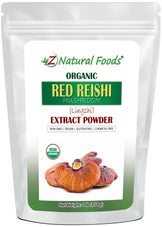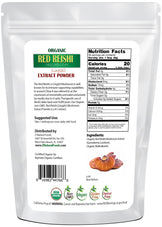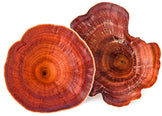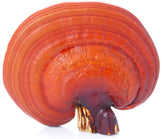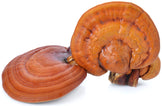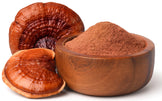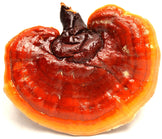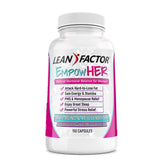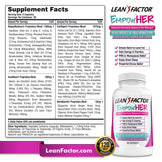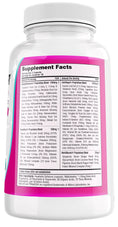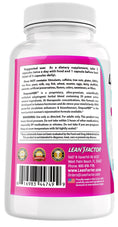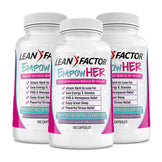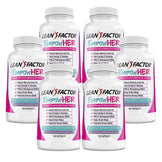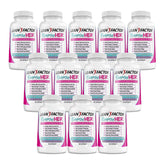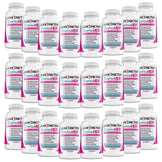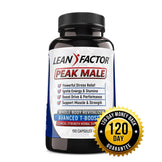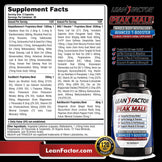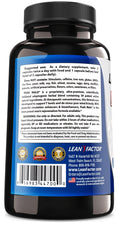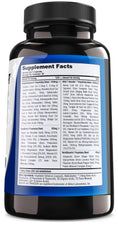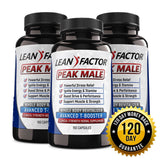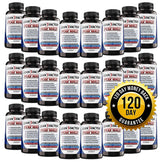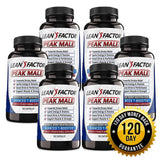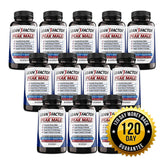Description
Description
You probably know I am a big fan of adaptogens. There are rules that should be followed when taking adaptogens to get the most bang for your buck.
For the more experienced adaptogen user who has been following this golden rule, it may be time to apply a more targeted approach to your program.
Which adaptogens are right for you
Your personality, state of mind and physical status are the biggest factors when deciding which adaptogens are right for you.
To make this simple, when we look at the action of an adaptogenic herb, there are 2 general categories. Within these categories, there are stronger and milder adaptogens.
The first category is stimulating adaptogens. Now, don’t get all stressed out (pun intended) as if you’re going to feel like you just drank six cups of coffee. In simple terms, stimulating adaptogens have a stronger and faster onset. If you lack both mental and physical stamina this type of adaptogen should be a leading herb in your formula because it won’t be long before you feel the benefits.
If you are someone who gets overheated, angry or has an explosive personality, then stimulating adaptogens may not be your best first line of defense as an individual herb or as the lead herb in a formula.
These types of adaptogens if used incorrectly may exacerbate the issue.
This does not necessarily mean someone with a more aggressive personality can’t use them. Depending on the specific herb, it can be used in much smaller amounts as a part of an overall formula (more as a supportive herb versus a primary herb). Some of the more stimulating adaptogens are Rhodiola Rosea and Red Ginseng.
Allow me to use myself as an example. I am someone who deals with anxiety, panic and runs on the “overheated” side. Red ginseng, on its own, or in large amounts within a formula, tends to make that “overheated” feeling much stronger. When used in smaller amounts in a formula I find it much less stimulating. On the other hand, I do extremely well with
Why can I use
One of the many active constituents found in red ginseng are ginsenosides and their primary mechanism of action is through increasing blood circulation and nerve growth factor activity. Rhodiola’s mechanism of action is its interaction with the HPA axis, nitric oxide production, and defense mechanism proteins. The answer is, it comes down to the mechanism of action.
Red ginsengs ability to increase blood circulation makes it more stimulatory than
The second category is calming adaptogens.
Two great examples of this are Ashwagandha and Schisandra. The effects of these adaptogens build over time. For my personality type, these are a godsend and are big players in the formulas I put together for myself. These adaptogens are for those who need the support due to a high-stress
You may be wondering whether or not those who are low on vital energy can use this type of adaptogen with success?
The answer is yes.
Calming adaptogens for those that need to rebuild vital energy are very helpful as a supportive herb in the formula. The important key is they should only be used as the supportive herbs in the formula for those who have low stamina.
Earlier, I spoke about the above categories having both strong and mild adaptogens. Two great examples are Eleuthero and American ginseng. Eleuthero is a mild adaptogen because it doesn’t build vital energy, it maintains it. Younger people in their 20’s and 30’s seem to get the best effects simply because at that age, being active, you are not in need of rebuilding as much as you are of the support. Can someone who needs to rebuild and restore use eleuthero? Yes, as long as they understand the role it plays and where it belongs in the formula (not as a lead herb). American ginseng, on the other hand, while not stimulating, is wonderful for restoring vital energy. The reason, based on its mechanism of action, it’s a stronger adaptogen.
Nourishing food-grade tonics
Three herbs mistakenly categorized as adaptogens are Maca root, Reishi Mushroom, and Astragalus. Truth be told, while all three of these possess adaptogenic qualities, they are not “true” adaptogens. A true adaptogen must fulfill all the criteria for what adaptogens do. Today, we often put herbs and foods in specific categories because they meet a part of the criteria. If we are going
Adaptogens must:
- Be nontoxic.
- Increase the resistance of the hormonal and immune system to ALL kinds of stressors through a nonspecific physiological response.
- Normalize body function NO MATTER how they have been altered by external stressors.
The three herbs mentioned above are close, but no cigar. Just look at how maca, astragalus, and
A match made in heaven
When we look at how stress tends to affect us, one of the first places
A nervine is a plant that has a direct effect on the nervous system to support restoration through several functions:
- Supporting healthy cerebral blood flow.
- Supporting the connection between the heart and nervous system.
- Possibly reducing anxiety levels and the damage that may happen as a result.
There may be a fine line but, the line does exist. Also, much like adaptogens, nervines (depending on the herb) can have a fast response or they may need to be taken for an extended period of time to see results. My three favorite general nervines (when used correctly) are bacopa,
The cause of the stress and the way it manifests will declare what nervines should be used. Understanding whether there was a mental or physical trauma
For example, bacopa and
One plus one equals three?
Yes. At least with herbs it does. This is why herbs in combination are always superior for long-term use over single herbs.
It should be noted, herbs used as individual substances are very effective, especially for short-term use. This can be summed up in one word; synergy.
Synergy is the understanding of how the “whole” works together and is vastly superior to the individual parts.
When you are trying to restore one’s health, I am sure you can see how there are many areas to consider. Another fact that should be understood is formulas don’t have to be premade in order to be considered a formula. Yes, if the herbs are prepared together as a formula you end up with a greater level of synergy. If you are in a pinch and only had 5-6 individual pre-made tinctures, combining them in specific ratios as a formula for immediate use will still provide a powerful level of synergy. The idea of synergy is the reason why someone like myself can use specific herbs as a part of a formula, that I normally, could not use as an individual herb. Synergy brings balance to a formulation. As your body heals, your healing responses evolve.
About Michael Stuchiner
 Michael Stuchiner is an experienced Master Herbalist, the Head of Education for Z Natural Foods, a teacher, and an accomplished author. With a 16-year specialization in medicinal herbs, Mike also has a vast knowledge of tonic and adaptogenic herbalism. Mike has enjoyed a 25-year career as an elite-level competitive powerlifter where he learned to heal his ‘mind and body’ as an avid user of herbal remedies.
Michael Stuchiner is an experienced Master Herbalist, the Head of Education for Z Natural Foods, a teacher, and an accomplished author. With a 16-year specialization in medicinal herbs, Mike also has a vast knowledge of tonic and adaptogenic herbalism. Mike has enjoyed a 25-year career as an elite-level competitive powerlifter where he learned to heal his ‘mind and body’ as an avid user of herbal remedies.
As an “in-the-trenches” herbalist, Mike has done more than 85 speaking engagements, consulted with clients ranging from young to elderly, worked with athletes in virtually all sports and with clients who have “dis-ease” states of a wide variety. Mike also mentors student Master Herbalists and will continue to teach the next generation to grow a deeper wisdom of the human body through appropriate herbal remedies.
For Bulk inquiries and custom formulations click here: https://www.znaturalfoods.com/pages/bulk
